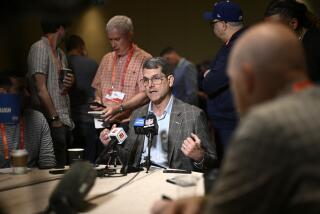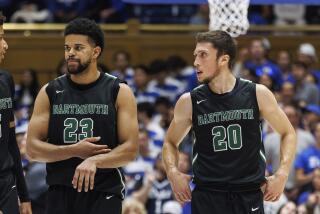Flight or Fight
- Share via
WASHINGTON — NFL Players Assn. Executive Director Gene Upshaw said Wednesday that he agrees with team owners and league executives who say suspended Ohio State running back Maurice Clarett should not be eligible for the 2004 draft.
“I don’t think he should be playing in the NFL, not yet,” Upshaw said during a break from a one-day league meeting to discuss various issues. “I think he should stay in school. He needs to get his education. I think that’s more important than this. This will be here.”
Upshaw and NFL Commissioner Paul Tagliabue received letters last week from Clarett’s attorney, Alan C. Milstein, requesting meetings with the league and the union. Clarett, a 19-year-old sophomore, was suspended for the season by Ohio State for receiving extra benefits and lying to investigators. He wants to have the option of turning pro next season.
Tagliabue said the league is prepared to defend its rule, which stipulates a player must be at least three years out of high school to be eligible for the draft. Clarett has been out of high school two years.
Jeff Pash, the league’s top attorney, plans to meet with Milstein next week.
“Everybody can look at the situation and talk about it,” Milstein said. “The point is to talk about it and see if we can work this out.”
Milstein said Clarett isn’t “foreclosing on any options” and denied a report that the letter threatened a lawsuit.
“It was a nonthreatening letter,” he said. “I didn’t use the word threat in there, and I don’t think they would take it that way.”
But people familiar with the situation believe Clarett will challenge the rule if the league blocks his path.
Upshaw said he received the letter and that his antitrust lawyer will look at it. He has not had any contact with Clarett’s representatives, and the players’ union will not be involved in next week’s meeting.
At the heart of the Clarett case are antitrust issues, the ability of a league to set its own rules and perhaps even the future of the relationship between college and pro football.
Anything that threatens the stability of college football could be damaging to the NFL, given that the college ranks provide the league with a free farm system -- not to mention a billion-dollar publicity machine that makes rookies famous before they have played a down in the pros.
“You start making exceptions, and everything comes apart,” said Ralph Wilson, owner of the Buffalo Bills. “Pretty soon, we’ll be taking them out of grade school.”
USC Coach Pete Carroll, former coach of the New York Jets and New England Patriots, said it would be a “terrible idea” for Clarett to enter the league after only one season of college football, three games of which he missed because of injuries.
“I don’t think it would be fun at all for the kid,” Carroll said. “I think it would be nasty.... The emotional side of it would catch up.”
It used to be that players had to be four years out of high school before they could enter the draft, and the league made exceptions on a case-by-case basis. Tagliabue instituted the current three-year policy shortly after becoming commissioner in 1990, and the league has never been challenged on the issue in court.
Pittsburgh Steeler owner Dan Rooney said he would prefer the league increase its requirement to four years out of high school.
“Kids should stay in school for four years,” he said. “It’s the best thing for them. We’d live with it. It’s the best thing for the colleges. It’s been a workable thing for 70 years. I think that they really miss something coming out of school.
“You can take it from the situation that you come out early, you get cut, you never get a chance. It’s great to mention Tommy Maddox [who left UCLA after his third year of college] and those kind of guys. But there’s not a whole lot of them.”
Upshaw, a Hall of Fame offensive lineman with the Oakland Raiders, said: “I would have loved to play against a guy who was 18. I probably could have whipped him.”
Gary Roberts, a professor at Tulane Law School and an antitrust specialist, said the league has a “very strong” argument that the three-year rule is a term of employment, even though the rule is not mentioned in the collective-bargaining agreement with the players’ union.
“You don’t need union agreement in order for something to be a term and condition of employment -- and several courts have held that entry requirements for professional athletes are terms and conditions of employment -- so it is highly likely that the NFL’s three-year rule is protected from antitrust challenge under the labor exemption,” Roberts said.
Clarett might have an easier time making his case to a judge and jury, Roberts said, had he not broken NCAA rules, violations that led to his suspension.
“I don’t think he’s got a strong case,” Roberts said. “He could win, but he’s got a couple of big hurdles. He goes in as a relatively unsympathetic plaintiff.... This is someone who’s made his own bed.”
In other league matters:
* Miami was awarded the 2007 Super Bowl.
* Team owners voted in favor of keeping NFL Europe rather than disbanding it. They approved a two-year business plan with the intent of coming up with a long-range projection.
*
Times staff writer Gary Klein contributed to this report.
More to Read
Go beyond the scoreboard
Get the latest on L.A.'s teams in the daily Sports Report newsletter.
You may occasionally receive promotional content from the Los Angeles Times.











